Apps
Auto Added by WPeMatico
Auto Added by WPeMatico
Photomath, the popular mobile app that helps you solve equations, has raised a $23 million Series B funding round led by Menlo Ventures. The app is a massive consumer success, and chances are you might already know about it if you have a teenager in your household.
The app lets you point your phone’s camera at a math problem. It recognizes what’s written and gives you a step-by-step explanation to solve the problem. You might think that it’s the perfect app for lazy students.
But there are many different use cases for Photomath. For instance, you can write an equation in your notebook and use Photomath to draw a graph.
Typing an equation on a keyboard is quite difficult. That’s why bridging the gap between the physical world and your smartphone is key to Photomath’s success. You can just grab a pen and write something down on a piece of paper. Essentially, it’s an AR calculator.
GSV Ventures, Learn Capital, Cherubic Ventures and Goodwater Capital are also participating in today’s funding round.
There’s an interesting story behind the app’s success. Photomath was originally designed as a demo app for another company called MicroBlink. At the time, the team was working on text recognition technology. It planned to sell its core technology to other companies that might find it useful.
In 2014, they pitched MicroBlink at TechCrunch Disrupt in London. And things changed drastically overnight as Photomath reached the first spot of the iOS App Store.
Photomath has now attracted more than 220 million downloads. As of this writing, it is still No. 59 in the U.S. App Store, one rank above Tinder. Other companies tried to build competitors, but it seems they didn’t manage to crush the tiny European startup.
The app seems even more relevant as many kids are spending more time studying at home. They can’t simply raise their hand to call on the teacher for some help.
Photomath is free and users can optionally pay for Photomath Plus, a premium version with more features, such as dynamic illustrations and animated tutorials.
Powered by WPeMatico
The day before Robinhood goes under the the Congressional hammer, domestic rival Public.com announced this morning that it has closed a $220 million funding round at a $1.2 billion valuation. News of the round was first broken by TechCrunch. Further reporting colored in the lines concerning the investment’s size and valuation range.
Confirming the funding news today, Public added a fresh metric to the mix, namely that it has reached one million members – over the course of just 18 months post-launch, the company was quick to point out.
That means that Public’s backers – its latest round was put together by prior investors, including Greycroft, Accel, Tiger Global, Inspired Capital and others – values the company at around $1,200 per current “member.” Whether or not that feels rich, we leave to you to decide.
But with rising interest in the savings and investing space – some data here — and Robinhood’s revenues growing to a run rate of more than $800 million in Q4 2020 and looking even better at the start of 2021, it’s not hard to see why investors are backing Public. It’s even easier if you believe that Robinhood’s brand has undergone material harm from its woes during the GameStop saga.
The pair, along with a host of other fintech services that offer savings and investing products, have been buoyed by a secular shift in banking away from the physical world (in-person shopping, bank branches, plastic cards) to the digital (neo-banks, ecommerce, virtual cards). Robinhood shook up the trading world with zero-cost investing, fitting neatly into the mobile and virtual banking future that is being built. And Public has taken that model a step further by dropping payment for order flow (PFOF), a method revenue generation in which companies like Robinhood get a small fee for sending their users’ trades to one particular market maker or another.
TechCrunch recently joked that it seems like “there is infinite money for stock-trading startups,” in light of the anticipated Public round, which has now has arrived. Let’s see who is next to take home a big check.
Powered by WPeMatico
Founded in late-2014, Salt Lake City-based Zencastr has become a kind of lifeline for many podcasters, as the pandemic pushed formerly in-person podcasts online. The startup is hardly a household name, but the company says it’s used by around 6% of all podcasts, based on an estimated 800,000 to 1.2 million active shows in the world.
I can certainly say, anecdotally, that just about every podcaster I’ve spoken to has tried the service, which offers a more specialized solution than video chat programs like Zoom and Skype. Some have managed to retrofit the latter to their needs, but Zencastr’s solution offers, among other things, high-quality audio recordings saved both locally and in the cloud.
As of last June, the company has also been testing a video feature. That’s long been a missing piece of the puzzle. I know I’ve moved over to Zoom since taking my show online during the pandemic. As pretty much any person can tell you a little over a year into the pandemic, video chat is no replacement for in-person interactions, but it works in a pinch. At the very least, it creates an additional dimension of human interaction you don’t get with voice alone.
Up to now, the video offering was only available as a closed beta. Today the beta opens to all users, bringing with it HD video recording, coupled with the already high-quality sound. I’ve been toying around with the feature for my own podcast and find it to be less straightforward than services like Zoom, but more customizable. It leaves you with HD video files you can edit into a tighter show or simply go with the split screen. There’s also a live chat, footnotes and a soundboard, much of which seemed aimed at essentially editing the shows in real time.
Along with the broader arrival of the video feature, Zencastr is announcing a $4.6 million seed round — the service’s first major funding since launch.
Founder and CEO Josh Nielsen tells TechCrunch that Zencastr has thus far been, “bootstrapped, self-funded and really just kind of a grassroots company in the podcasting space. A lot of people are getting interested in podcasting right now and we feel like it’s important to have a company like ours continue to represent our creators. They’re our North Star.”
As interest in podcasting has grown, Zencastr’s use has expanded with it. The company says it has seen around a 147% growth in podcasting hours since the beginning of COVID-19. The seed round is led by Utah-based Kickstart, with participation from former Flipagram executives Brian Dilley and Farhad Mohit and former Skullcandy CEO Jeremy Andrus, among others.
“This company started off pretty small and didn’t have a lot of resources,” Nielsen adds. “But we’ve always been profitable, we’ve always been growing. We still are, but we’re raising money to accelerate that growth. This is also a rebrand and a step forward in the reliability and stability of the platform.”
Stability has been something of an issue in the past with many of the Zencastr users I’ve spoken to. Spending more time with this service ahead of this news, I certainly found some nits to pick, including an audio delay I haven’t experienced with non-devoted services like Skype and Zoom. It’s not the end of the world, but it’s the kind of thing that can really throw you off your rhythm during an interview. The video presentation is also lacking in sophistication, but that’s to be expected in a closed beta.
The funding will go to smoothing out some of those wrinkles, as well as hiring.
“Headcount is one of the primary reasons for raising this round,” co-founder and CPO Adrian Lopez tells TechCrunch. “We were a fully distributed team before COVID existed. We have people in 11 different countries around the world. That was a very conscious choice. We believe that distribution allows us to work with some of the best people, regardless of where they are.”
Today also sees the launch of “Digital Nomad,” a podcast series produced by Zencastr that explores its own origin story. Though, the company is quick to add that this isn’t the beginning of a major push into producing original content.
“We believe strongly in podcasting as a medium that connects people,” says Lopez. “We formed the company around that. We’re fully distributed so we can put our money where our mouth is and put people all over and connect via this medium. We want to start telling that story.”
Zencastr has seen a fair bit of increased competition in the category, including the likes of SquadCast and Riverside.fm. The company’s solid growth over the past year could also see some regression as more people feel comfortable recording shows in person, as the vaccines have been sufficiently distributed.
“We’re going to see some retraction, I think, as things and people go back to work,” says Lopez. “But I think it will all come out in the wash, because there’s just a much bigger-growing interest in podcasting over all. It happened before COVID and it will continue after COVID.”
Powered by WPeMatico
Chalk one up for Jigsaw, an “anti-superficial” dating app that has scored £2.7 million ($3.7 million) in seed funding to put toward U.S. expansion. The round is led by a lead generation company for online dating companies, called The Relationship Corp., with backing from angel investors in the U.S. and U.K. “primarily” in the tech sector.
As the startup’s name suggests, Jigsaw adds a little cryptic fun to the transactional business of swiping photos of other singles in search of dating chemistry in a bid to offer a less superficial experience.
Albeit their (patented) anti-superficial twist looks a tad gimmicky at first blush: They literally superimpose a digital jigsaw over the faces of users, with pieces removed gradually the more you interact — and the full face only revealed after a pre-set amount of in-app engagement.
Digital filters are also banned, per the app’s FAQ; they only want “real” selfies. So no cute cat ears, etc.
They’ve got a few more tricks up their sleeve but don’t want to offer a public reveal of the planned features we guessed were coming just yet (but, well, a quick glance at the app and it’s basically a half finished jigsaw puzzle of their product roadmap).
The U.K. startup — which was founded back in 2016 by a couple of friends, Alex Durrant (co-founder and CEO) and Max Adamski (co-founder and CPO), when they were at university (and finding the dating app scene frustratingly superficial, as they tell it, going on to quit their jobs and go all in on the project in 2018) — launched its puzzle-faced dating experience in London in 2019; and opened up to the U.S. in November last year.
Jigsaw has some 150,000+ registered users across those two markets at this point, with 50,000 in the U.S. — and an appetite to step things up over the pond now that they’re flush with new funds.
Durrant says the team is hoping to hit half a million U.S. users in the next six months. They reckon there’s a trend toward less superficial swiping in the American dating app scene that Jigsaw is well-positioned to tap into.
“We’re not insane and think people look better with puzzles over their faces, I promise, the puzzle is our middle finger to the superficial dating industry,” he says. “It exists as you say to encourage more meaningful/sustained interactions and to help users look beyond the looks.”
Currently, Jigsaw’s face-shielding mechanism involves a puzzle made up of 16 pieces. All photos start with one piece removed “so you get a sneak peek”. Another then comes off when a user likes (matches with) the person so at the start of chatting there are two pieces revealed.
More pieces are removed as the pair mutually exchange messages until there’s no more puzzle bits left. Hopefully you also won’t run out of conversation at that point.
“Over six messages each (12 in total) is what we believe is the minimum needed for a meaningful conversation,” says Durrant. “That’s why the jigsaw puzzle currently unveils fully after seven messages are exchanged (14 pieces revealed in total), revealing the face underneath. This number has been tested and this is the current sweet spot for our users.”
Jigsaw isn’t unique in the concept of shielding facial visuals to encourage dating app users to do more chatting and less mindless swiping. There are a whole bunch of “slower reveal” style twists aimed at reducing “dating app fatigue” — as another app, INYN, which also limits the velocity of the profile reveal, puts it.
Another app which blurs users’ photos until they do some chatting is Taffy. There’s also Muslim matchmaking app Veil — which offers a “digital veil” feature (aka an opaque filter) that it applies to all profile photos, male and female, until a mutual match is made.
Other “anti-superficial” dating apps, like Willow, try a Q&A style approach — getting users to answer questions to see more photos. The list goes on.
Still, Jigsaw has come up with perhaps the most visually obvious (and gamified) twist on this slow-reveal format. And being so immediately, well, obvious, it might make its “slow reveal” twist stick for longer than the average “love is blind” alternative dating app.
Its seed investment is not about buying users, either. We made sure to check.
The Relationship Corp. does offer user acquisition/traffic generation services to dating apps — including those it invests in — but in Jigsaw’s case the investment is a straight equity investment, per Durrant. So it’s at least sounding confident in its ability to grow.
“They’re super low-key but are known in the industry,” says Durrant of the lead seed investor. “Steve Happas their CEO is ex-Match and… sits on our advisory board [as part of the investment]. We had an option to work with them to acquire users but instead, they are supporting our internal team in an advisory capacity.”
Powered by WPeMatico
Welcome back to This Week in Apps, the weekly TechCrunch series that recaps the latest in mobile OS news, mobile applications and the overall app economy.
The app industry is as hot as ever, with a record 218 billion downloads and $143 billion in global consumer spend in 2020.
Consumers last year also spent 3.5 trillion minutes using apps on Android devices alone. And in the U.S., app usage surged ahead of the time spent watching live TV. Currently, the average American watches 3.7 hours of live TV per day, but now spends four hours per day on their mobile devices.
Apps aren’t just a way to pass idle hours — they’re also a big business. In 2019, mobile-first companies had a combined $544 billion valuation, 6.5x higher than those without a mobile focus. In 2020, investors poured $73 billion in capital into mobile companies — a figure that’s up 27% year-over-year.
This week, we’re taking a look at the Bumble IPO, app store subscription revenue and talk to a developer on a crusade against the fake ratings plaguing the App Store. We’re also checking in on the missing Google privacy labels…with a spreadsheet of all 100 apps.
This Week in Apps will soon be a newsletter! Sign up here: techcrunch.com/newsletters.
Bumble, the dating app positioned as one of Tinder’s biggest rivals, began trading on public markets on Thursday. The company priced its shares at $43, above its earlier target range of $37 to $39. But once live, BMBL began trading up nearly 77% at $76 per share on Nasdaq, closing the day with a market cap of $7.7 billion and the stock at $70.55.
The app itself was founded in 2014 by early Tinder exec Whitney Wolfe Herd, who now, at 31, is the youngest woman founder to take a U.S. company public and, thanks to the IPO, the world’s youngest self-made woman billionaire, as well, said Fortune.
Wolfe Herd successfully leveraged her knowledge of the online dating market, then combined that with an understanding of how to position a dating app to make it more appealing to women.
On Bumble, women message first, for example, and the company often touts features and updates designed to protect women from bad actors. A lot of what Bumble does is just marketing and spin overlaid on the Tinder model. Like other dating apps, Bumble uses a similar format to connect potential matches: a swipeable “people catalog,” where users look at photos, primarily, to determine interest. Bumble, like others, also makes money by charging for extra features that give users a better shot or more efficient experience.
But all this works because users believe Bumble to be different. They believe Bumble is also capable of delivering higher-quality matches than Tinder, which has increasingly re-embraced its persona as a hook-up app.
The IPO’s success also sends a signal that investors are expecting in-person dating to rebound post-pandemic, and getting in early on the next big mass market dating app is an easy win.
Developer Kosta Eleftheriou, a Fleskly co-founder, has been on a crusade against the scammy and spammy apps overrunning the App Store, as well as Apple’s failure to do much about it.
Earlier this month, Kosta complained that copycat apps were undermining his current business, as the developer of an Apple Watch keyboard app, FlickType. Shady clones boosted by fake ratings and reviews promised the same features as his legit app, but then locked their customers into exorbitant subscriptions, earning the scammers hundreds of thousands per month.
In his eyes, the problem wasn’t just that clones existed, but that Apple’s lack of attention to fake reviews made those apps appear to be the better choice.
Although Apple finally removed most of his fraudulent competitors after his rants gained press attention, he’s frustrated that the system was so broken in the first place.
This week, Kosta returned with another Twitter thread detailing the multimillion-dollar scams that pretend to be the best Roku remote control app. One app, “Roku Remote Control – Roki,” for example, had a 4.5 stars across 15K+ ratings. The app was a free download, but immediately tries to lock users into a $4.99/week subscription or a lifetime payment of $19.99. However, the app offers a “buggy, ad-infested, poorly designed” experience, Kosta says.
He then used AppFigures to see only those reviews of the Roki app that also had text. When displayed like this, it was revealed that “Roki” was really just a 1.7-star app, based on consumers who took the time to write a review.
What’s worse, Kosta has also argued, that even when Apple reacts by removing a bad actor’s app, it will sometimes allow the developer to continue to run other, even more profitable scams.
Kosta says he decided to spearhead a campaign about App Store scams to “get the word out about how all these scams manage to sustain themselves through a singular common flaw in the App Store — one that has been broken for years.”
He also notes that although Apple responded to him, he believes the company is hoping for the story to blow over.
“The way Apple tried to communicate with me also didn’t help ease my concern — they either don’t get it, or are actively trying to let the story fizzle out through some token gestures. But what they need to do first and foremost, is acknowledge the issue and protect their customers,” Kosta told TechCrunch.
One potential argument here is that because Apple financially benefits from successful subscription app scams, it’s not motivated to prioritize work that focuses on cleaning up the App Store or fake ratings and reviews. But Kosta believes Apple isn’t being intentionally malicious in an effort to grow the subscription business, it’s just that fake App Store reviews have become “a can that’s been perpetually kicked down the road.” Plus, since Apple touts the App Store as a place users can trust, it’s hard for them to admit fault on this front, he says.
Since the crusade began, Kosta has heard from others developers who have sent him examples “dozens and dozens of scams.”
“I will just keep exposing them until Apple acknowledges the problem,” he says.
Apps saw record downloads and consumer spending in 2020, globally reaching somewhere around $111 billion to $112 billion, according to various estimates. But a growing part of that spend was subscription payments, a report from Sensor Tower indicates. Last year, global subscription app revenue from the top 100 subscription apps (excluding games), climbed 34% year-over-year to $13 billion, up from $9.7 billion in 2019.
The App Store, not surprisingly, accounted for a sizable chunk of this subscription revenue, given it has historically outpaced the Play Store on consumer spending. In 2020, the top 100 subscription apps worldwide generated $10.3 billion on the App Store, up 32% over 2019, compared with $2.7 billion on Google Play, which grew 42% from $1.9 billion in 2019. (Read more here.)
Google said it would update its iOS apps with privacy labels weeks ago. While it did roll out some, it has yet to update top apps with Apple’s new labels, including key apps like the Google search app, Google Pay, Google Assistant, Google One, Google Meet, Google Photos, Google Calendar, Google Maps, Google News, Google Drive, Gmail and others. (Keep track of this with me here. Want to help? Email me.)
Overall, the majority of Google’s apps don’t have labels. While Google probably needed some time (and a lot of lawyers) to look this over, it’s now super late to put its labels out there. At this point, its iOS apps are out of date — which Google accidentally alerted users to earlier this week. This is awful optics for a company users already don’t trust, and a win for Apple as a result. (Which, of course, means we need to know for sure that Apple isn’t delaying Google’s submissions here…)
Still, Google had time to get this done. Its December code freeze is long over, and everyone else, for the most part, has gotten on board with the new labels. Why can’t Google?
Apple may soon allow users to set a different default music service. The company already opened up the ability to choose a different default browser and email app, but now a new feature in the iOS 14.5 beta indicates it may allow users to set another service, like Spotify, as the default option when asking Siri to play tunes. This, however, could be an integration with HomePod and Siri voice control support in mind, rather than something as universal as switching from Mail app to Gmail.
Apple Maps to gain Waze-like features for reporting accidents, hazards and speed traps. Another new feature in the iOS 14.5 beta will allow drivers to report road issues and incidents by using Siri on their iPhone or through Apple’s CarPlay. For example, during navigation, they’ll be able to tell Siri things like “there’s a crash up head,” “there’s something on the road,” or “there’s a speed trap here.”
Apple tests a new advertising slot on the App Store. Users of Apple’s new iOS 14.5 beta have reported seeing a new sponsored ad slot that appears on the Search tab of the App Store, under the “Suggested” heading (the screen that shows before you do a search). The ad slot is also labeled “Ad” and is a slightly color to differentiate it from the search results. It’s unclear at this time if Apple is planning to launch the ad slot or is just testing it.
The App Store announces price changes for Cameroon, Zimbabwe, Germany and the Republic of Korea.
Apple alerts developers to Push Notification service server certificate update, taking place on March 29, 2021.
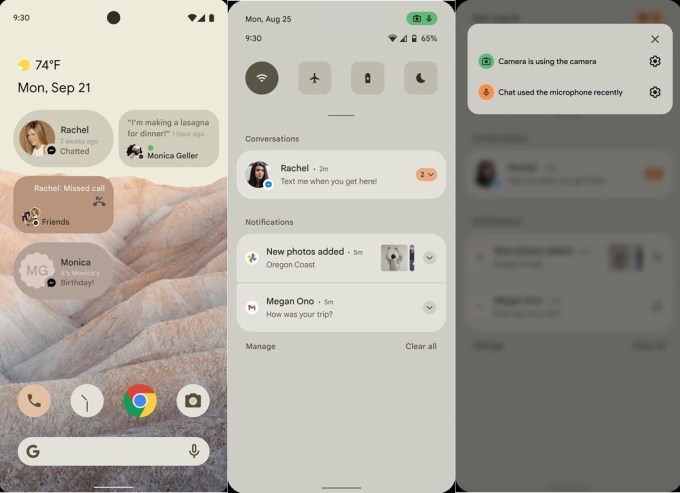
Image Credits: XDA Developers
Alleged Android 12 screenshots snagged from an early draft document by XDA Developers show Google could be borrowing some ideas from Apple’s iOS for its next update. One feature may put colored dots in the status bar to indicate when the camera or microphone are being accessing, for example. Users may also be able to toggle off their camera, microphone or location access entirely. Google may also add a “conversations” widget to show recent messages, calls and activity statuses, among other things.
Google bans data broker Predicio that was selling user data collected from a Muslim prayer app to Venntel, a government contractor that sells location data from smartphones to ICE, CBP and the FBI, following a Motherboard investigation. Google alerted developers they had a week to remove the SDK from their apps or they’d be removed from Google Play.
Google updated its instructor-led curriculum for Android Development with Kotlin, a major update for the course materials that were first released in 2018. The new materials are designed for either in-person or virtual learning, where educators combine lectures and codelabs.
Google briefly notified users that their Google iOS apps were “out of date” — an embarrassing mistake that was later corrected server-side. The bug arrived at a time when Google has yet to have updated its privacy labels for many of its largest apps, including Google, Gmail, Assistant, Maps, Photos and others.
Apple released a new iOS app, For All Mankind: Time Capsule, to promote its Apple TV+ series, “For All Mankind.” The app was built using Apple’s ARKit framework, offering a new narrative experience told in AR format featuring the show’s star. In the app, users join Danny as he examines keepsakes that connect to stories about impacting events in the lives of his parents, Gordo and Tracy Stevens, in the alternative world of the TV show.
 TikTok is expanding its e-commerce efforts. The company told marketers it’s planning a push into livestreamed e-commerce, and will also allow creators to share affiliate links to products, giving them a way to earn commissions from their videos. The company also recently announced a partnership with global ad agency WPP that will give WPP agencies and clients early access to TikTok ad products. It will also connect top creators with WPP for brand deals.
TikTok is expanding its e-commerce efforts. The company told marketers it’s planning a push into livestreamed e-commerce, and will also allow creators to share affiliate links to products, giving them a way to earn commissions from their videos. The company also recently announced a partnership with global ad agency WPP that will give WPP agencies and clients early access to TikTok ad products. It will also connect top creators with WPP for brand deals.
The Single Day Shopping festival drove high mobile usage. Consumers spent 2.3 billion hours in Android shopping apps during week of November 8-15, 2020, reports App Annie.
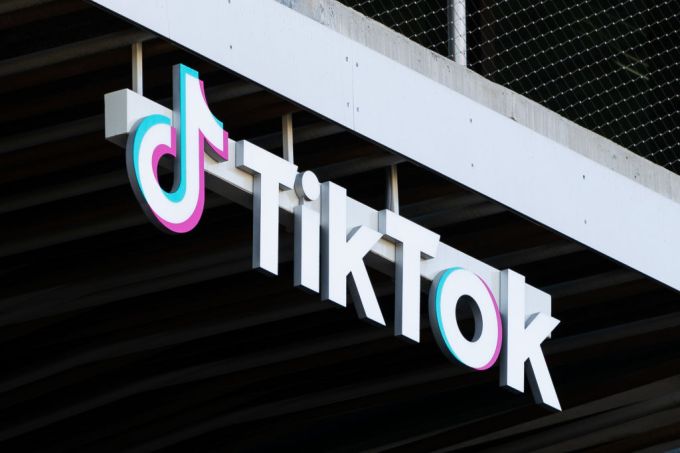
Image Credits: AaronP/Bauer-Griffin/GC Images
 TikTok’s sale of its U.S. operations to Oracle and Walmart is shelved. The Biden administration undertook a review of Trump’s efforts to address security risks from Chinese tech firms, including the forced sale of TikTok’s U.S. operations. The Trump administration claimed TikTok was a national security threat, and ordered TikTok owner ByteDance to divest its U.S. operations if it wanted to continue to operate in the country. Several large tech companies stepped up to the plate to take on the potential windfall. But Biden’s review of the agency action puts Trump’s plan on an indefinite pause. As a result, the U.S. government will delay its appeal of of federal district court judge’s December 2020 injunction against the TikTok ban. Discussions between U.S. national security officials and ByteDance are continuing, however.
TikTok’s sale of its U.S. operations to Oracle and Walmart is shelved. The Biden administration undertook a review of Trump’s efforts to address security risks from Chinese tech firms, including the forced sale of TikTok’s U.S. operations. The Trump administration claimed TikTok was a national security threat, and ordered TikTok owner ByteDance to divest its U.S. operations if it wanted to continue to operate in the country. Several large tech companies stepped up to the plate to take on the potential windfall. But Biden’s review of the agency action puts Trump’s plan on an indefinite pause. As a result, the U.S. government will delay its appeal of of federal district court judge’s December 2020 injunction against the TikTok ban. Discussions between U.S. national security officials and ByteDance are continuing, however.
 Facebook is said to be building its own Clubhouse rival. Mark Zuckerberg made a brief appearance on Clubhouse earlier this month, which now seems more like a reconnaissance mission, if The NYT’s report is true. Facebook will have to tread lightly, given its still under regulatory scrutiny for anticompetitive practices, which included cloning and acquiring its competition.
Facebook is said to be building its own Clubhouse rival. Mark Zuckerberg made a brief appearance on Clubhouse earlier this month, which now seems more like a reconnaissance mission, if The NYT’s report is true. Facebook will have to tread lightly, given its still under regulatory scrutiny for anticompetitive practices, which included cloning and acquiring its competition.
 Microsoft reportedly approached Pinterest about an acquisition of the $51 billion social media platform, but those talks are no longer active.
Microsoft reportedly approached Pinterest about an acquisition of the $51 billion social media platform, but those talks are no longer active.
TikTok partnered with recipe app Whisk to add a way for users to save recipes featured in TikTok videos. The feature is currently in pilot testing with select creators.
Mark Cuban is co-founding a new podcast app, Fireside. The Shark Tank star and investor has teamed up with Falon Fatemi, who sold customer intelligence startup Node to SugarCRM last year. Fireside is basically Clubhouse, but adds the ability to export live conversations as podcasts.
TikTok expands its Universal Music Group deal just days after UMG pulled its song catalog from Triller, saying the app was withholding artist payments.
Indian firm ShareChat will integrate Snapchat’s Camera Kit technology into its Moj app to enable AR features. The move will give Snap a foothold in a key emerging market.
Instagram said it will impose stricter penalties against those who send abusive messages, including account bans, and develop new controls to reduce the abuse people see in their DMs. The announcement followed a recent bout of racist abuse targeted at footballers in the U.K. A joint statement from Everton, Liverpool, Manchester United and Manchester City condemned the abuse, saying “there is no room for racism, hate or any form of discrimination in our beautiful game.”
Instagram tells creators that it won’t promote their recycled TikToks. The company announced via its @creators account a set of best practices for Reels, noting that those featuring a watermark or logo (which TikTok smartly attaches to its content), won’t be recommended frequently on Instagram’s platform. Of course, TikTok creators are already circulating videos with tips about how to cut out the logo from TikTok videos by first exporting the video as a Live Photo, then going to their iOS Photos app, clicking on the Live Photo and choosing “Save as Video.” Problem solved.

Image Credits: Google
Google Photos for Android adds previously Pixel-only features — but only if users subscribe to Google One. The paywalled features include machine learning-powered editing tools like Portrait Blur, Portrait Light and Color Pop. There’s also a new video editor on iOS with an Android update planned. The editor now lets you crop, change perspective, add filters, apply granular edits (including brightness, contrast, saturation and warmth) and more.
Adobe adds collaboration and asynchronous editing to Photoshop, Illustrator and Fresco. The update will be supported across platforms, including desktop, iPad and iPhone.
Waze adds Audible to its list of in-app audio players. The integration allows you to easily play your audiobooks while driving. Waze already supported in-app music integrations, like YouTube Music and Spotify, thanks to developer integrations with the Waze Audio Kit.
HBO Max is going international. The app will be expanded to 39 Latin American and Caribbean territories in June, replacing the existing HBO GO app.
Picture-in-picture mode returned to YouTube on iOS with the launch of the iOS 14.5 beta.
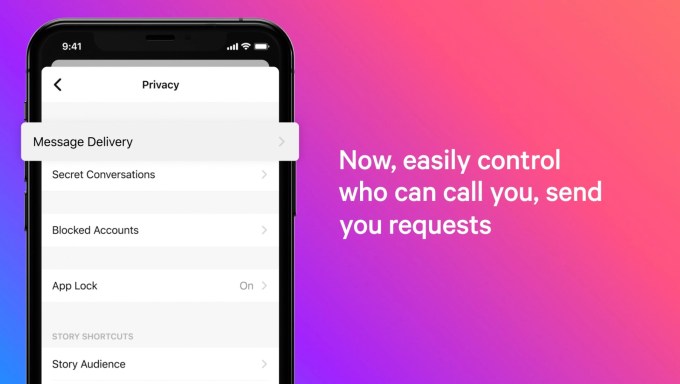
Facebook Messenger added a new feature that makes it easier to block and mass-delete Message Requests from people you don’t know. It also said it’s working on new ways to report abuse and providing better feedback on the status of those reports.
The Biden administration pauses the Trump ban on WeChat. The administration asked a federal appeals court to place a hold on proceedings over the WeChat a day after it asked for a similar delay over the TikTok case, saying it needed time to review the previous administration’s efforts, which are now in the appeals stage.
NHS Covid-tracing app has prevented 600,000 infections in England and Wales, researchers estimated in one of the first studies of smartphone-based tracing. The app used the tracing system built by Apple and Google.
The Robinhood backlash hasn’t stopped the downloads. Many users downrated the app after it halted meme stock trading earlier this month — a move that’s now under Congressional investigation and has prompted multiple lawsuits. But the app continues to receive downloads. The day after it halted trades was its second-largest by downloads ever, and downloads remained high in the days that followed. In January 2021, the app was installed 3.7 million times in the U.S., or 4x the installs of January 2020.
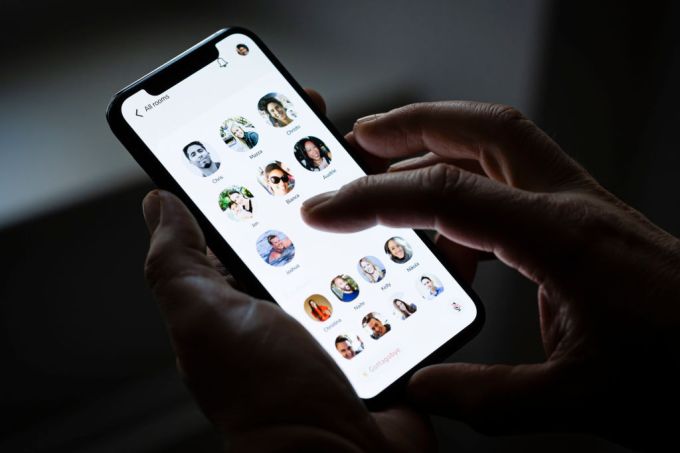
Image credits: Thomas Trutschel/Photothek via Getty Images
The Chinese government blocked Clubhouse, which had been rapidly gaining attention in the country. The app itself had only briefly been made available in Apple’s China App Store last fall, but those had it installed could access its audio chat rooms without a VPN. Prior to the ban, a group discussing the 1989 pro-democracy Tiananmen protest reached 5,000 participants — the max number of participants Clubhouse supports.
A new North Dakota Senate bill proposes to ban app stores like Apple and Google from requiring developers to exclusively use their store and payment mechanisms to distribute apps, and would prevent them from retaliating, at the risk of fines. Apple’s Chief Privacy Engineer Erik Neuenschwander said the bill “threatens to destroy the iPhone as you know it,” and that Apple succeeds because it “works hard to keep the bad apps out of the App Store.”
The Coalition for App Fairness (CAF) announced that Meghan DiMuzio has now joined as its first executive director. The advocacy group fighting against app store anticompetitive behavior is made up of over 50 members, including Spotify, Tile, Basecamp, Epic Games and others.
The U.S. House of Representatives Committee on Energy and Commerce has asked Apple to improve the credibility of App Store privacy labels, so consumers aren’t harmed. The request was made after an investigation by The Washington Post revealed that many labels were false, leading to questions as to whether the labels could be trusted at all.
Apple will begin to proxy Google’s “Safe Browsing” service used by Safari through its own servers starting with iOS 14.5. Safari on iPhone and iPad includes a “Fraudulent Website Warning” feature that warns users if they’re visiting a possible phishing site. The feature leverages Google’s “Safe Browsing” database and blocklist. Before, Google may have collected user’s IP address during its interaction with Safari, when the browser would check the website URL against Google’s list. Now, Apple will proxy the feature through Apple’s own servers to limit the risk of information leaks. The change was reported by The 8-bit, MacRumors and others, after a Reddit sighting, and confirmed by Apple’s head of Engineering for WebKit.
A generically named app “Barcode Scanner” on the Google Play Store had been operating as a legit app for years before turning into malware. Users of the app, which had over 10 million installs, began to experience ads that would open their browser out of nowhere. The malware was traced to the app and Google removed it from the Play Store. Unfortunately, users review-bombed a different, innocent app as a result, leaving it 1-star reviews and accusing it of being malware.
Google Chrome’s iOS app is testing a feature that would lock your Incognito tabs with either Touch ID or Face ID to add more security to the browser app.
Google Fi VPN for Android exits beta and expands to iPhone. The VPN app, designed for Google Fi users, is meant to encrypt connections when on public Wi-Fi networks or when using sites that don’t encrypt data. Users, however, question the privacy offered by VPN from Google.
Twitter said the iOS 14 privacy update will have a “modest impact” on its revenue. The companies joins others, including Facebook and Snap, in saying that Apple is impacting their business’s monetization.
 Quilt, a “Clubhouse” focused self-care, raised $3.5 million seed round led by Mayfield Fund. The app has a similar format to audio social network, Clubhouse, but rooms are dedicated less to hustle culture and more to wellness, personal development, spirituality, meditation, astrology and more.
Quilt, a “Clubhouse” focused self-care, raised $3.5 million seed round led by Mayfield Fund. The app has a similar format to audio social network, Clubhouse, but rooms are dedicated less to hustle culture and more to wellness, personal development, spirituality, meditation, astrology and more.
 Match Group, owner of dating apps like Match and Tinder, will buy Korean social media company Hyperconnect for $1.73 billion. The company runs two apps, Azar and Hakuna Live, both which focus on video, including video chats and live broadcasts.
Match Group, owner of dating apps like Match and Tinder, will buy Korean social media company Hyperconnect for $1.73 billion. The company runs two apps, Azar and Hakuna Live, both which focus on video, including video chats and live broadcasts.
 Electronic Arts buys Glu Mobile, maker of the “Kim Kardashian: Hollywood” mobile game in a $2.4 billion deal. The all-cash deal will also bring other games, like “Diner Dash” and “MLB Tap Sports Baseball” to EA, which said it made the acquisition because mobile is the “fastest-growing platform on the planet.”
Electronic Arts buys Glu Mobile, maker of the “Kim Kardashian: Hollywood” mobile game in a $2.4 billion deal. The all-cash deal will also bring other games, like “Diner Dash” and “MLB Tap Sports Baseball” to EA, which said it made the acquisition because mobile is the “fastest-growing platform on the planet.”
 French startup Powder raised $12 million for its social app for sharing clips from your favorite games, and follow others with the same interests. The app can capture video content from both desktop and mobile games.
French startup Powder raised $12 million for its social app for sharing clips from your favorite games, and follow others with the same interests. The app can capture video content from both desktop and mobile games.
 Reddit’s valuation doubled to $6 billion after raising $250 million in a late-stage funding round led by Vy Capital, following the r/WallStreetBets and GameStop frenzy. The company was previously valued at $3 billion, and is also backed by Andreessen Horowitz and Tencent Holdings Ltd.
Reddit’s valuation doubled to $6 billion after raising $250 million in a late-stage funding round led by Vy Capital, following the r/WallStreetBets and GameStop frenzy. The company was previously valued at $3 billion, and is also backed by Andreessen Horowitz and Tencent Holdings Ltd.
 SplashLearn raised $18 million for its game-based edtech platform. The startup offers math and reading courses for Pre-K through 5th grade, and over 4,000 games and interactive activities.
SplashLearn raised $18 million for its game-based edtech platform. The startup offers math and reading courses for Pre-K through 5th grade, and over 4,000 games and interactive activities.
 Goody raised $4 million for its mobile app that lets you send gifts to friends, family and other loved ones over a text message. The other user can then personalize the gift and share their address, if you don’t have that information.
Goody raised $4 million for its mobile app that lets you send gifts to friends, family and other loved ones over a text message. The other user can then personalize the gift and share their address, if you don’t have that information.
 VerSe Innovation, the Bangalore-based parent firm of news and entertainment app Dailyhunt and short video app Josh, a TikTok rival, raised over $100 million in Series H round led by Qatar Investment Authority and Glade Brook Capital Partners. The round turns the company into a unicorn.
VerSe Innovation, the Bangalore-based parent firm of news and entertainment app Dailyhunt and short video app Josh, a TikTok rival, raised over $100 million in Series H round led by Qatar Investment Authority and Glade Brook Capital Partners. The round turns the company into a unicorn.
 Tickr, an app that lets U.K. consumers make financial investments based on their impact to society and the environment, raised $3.4 million in a round led by Ada Ventures, a VC firm focused on impact startups.
Tickr, an app that lets U.K. consumers make financial investments based on their impact to society and the environment, raised $3.4 million in a round led by Ada Ventures, a VC firm focused on impact startups.
 Huuuge Inc., a developer of free-to-play mobile casino games, raised $445 million in its IPO in Warsaw, becoming Poland’s largest-ever gaming industry listing.
Huuuge Inc., a developer of free-to-play mobile casino games, raised $445 million in its IPO in Warsaw, becoming Poland’s largest-ever gaming industry listing.
 Uptime, an educational app that offers 5-minute bits of insight from top books and courses, raised a $16 million “seed” round led by Tesco CEO Sir Terry Leahy; entrepreneur and chairman of N Brown, David Alliance; and members of private equity firm Thomas H Lee.
Uptime, an educational app that offers 5-minute bits of insight from top books and courses, raised a $16 million “seed” round led by Tesco CEO Sir Terry Leahy; entrepreneur and chairman of N Brown, David Alliance; and members of private equity firm Thomas H Lee.
 Modern Health, a mental health services provider for businesses to offer to their employees, raised $74 million, valuing its business at $1.17 billion. The Modern Health mobile app assesses each employee’s need and then provide care options.
Modern Health, a mental health services provider for businesses to offer to their employees, raised $74 million, valuing its business at $1.17 billion. The Modern Health mobile app assesses each employee’s need and then provide care options.
 Scalarr raised $7.5 million to fight mobile ad fraud. The company offers products to detect ad fraud before an advertiser bids and other tools used by ad exchanges, demand-side platforms, and supply-side platforms.
Scalarr raised $7.5 million to fight mobile ad fraud. The company offers products to detect ad fraud before an advertiser bids and other tools used by ad exchanges, demand-side platforms, and supply-side platforms.
 Dublin-based food ordering app Flipdish, a Deliveroo rival, raised €40 million from global investment firm Tiger Global Management. The app offers a lower commission than other delivery rivals and is even testing drone delivery with startup Manna Aero.
Dublin-based food ordering app Flipdish, a Deliveroo rival, raised €40 million from global investment firm Tiger Global Management. The app offers a lower commission than other delivery rivals and is even testing drone delivery with startup Manna Aero.
 Jackpot, an NYC-based lottery ticket app, raised $50 million Series C. The app allows users to play the lottery games in nine different states, including Arkansas, Colorado, Minnesota, New Hampshire, New Jersey, New York, Ohio, Oregon, Texas and Washington, D.C.
Jackpot, an NYC-based lottery ticket app, raised $50 million Series C. The app allows users to play the lottery games in nine different states, including Arkansas, Colorado, Minnesota, New Hampshire, New Jersey, New York, Ohio, Oregon, Texas and Washington, D.C.
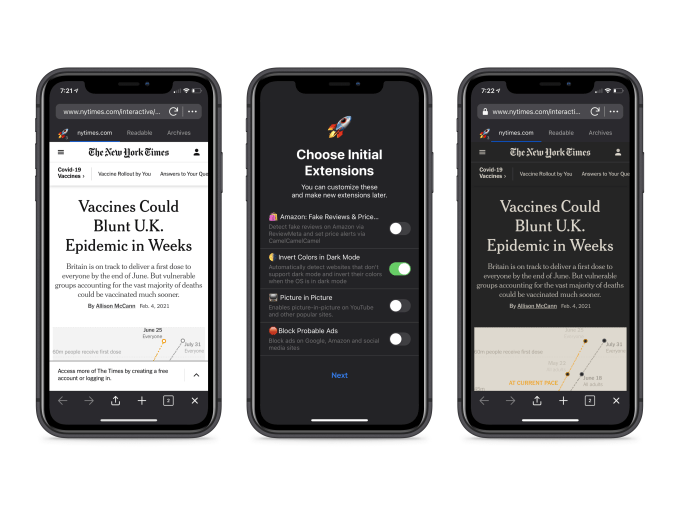
Image Credits: Insight
A new startup called Insight is bringing web browser extensions to the iPhone, with the goal of delivering a better web browsing experience by blocking ads and trackers, flagging fake reviews on Amazon, offering SEO-free search experiences or even calling out media bias and misinformation, among other things. These features are made available by way of the browser’s “extensions,” which work by way of a “sub-tab” workflow where you navigate using swiping gestures. For example, when online shopping, you could view the product you’re interested in, then swipe over to see the available coupons, the trusted product reviews or to comparison shop across other sites.
The app is a free download on iOS.
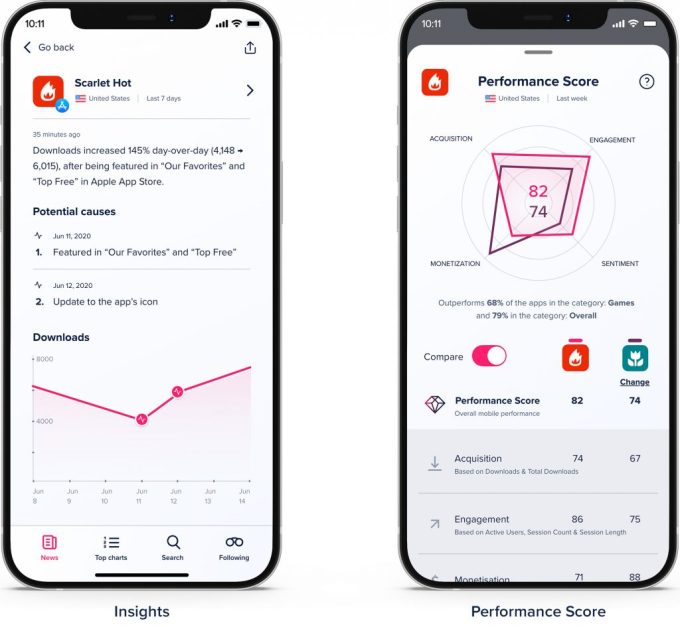
Image Credits: App Annie
App Annie’s new app Pulse is aimed not at the more advanced analyst or marketer immersed in data, but rather at the executive who wants a “more elevated, top-down view” of the app ecosystem, TechCrunch reported. The app offers easy access to the app stores’ top charts, plus tools for tracking apps, and a news feed highlighting recent trends. Another feature, the App Annie Performance score, which aims to distill user acquisition, engagement, monetization and sentiment into a single benchmark.
The app is currently iOS-only.
Powered by WPeMatico
We take an in-depth look at TikTok usage in Russia, Facebook’s Oversight Board looks beyond Facebook and Sesame Workshop backs an edtech fund. This is your Daily Crunch for February 11, 2021.
The big story: TikTok becomes a political battleground in Russia
Russia has a small but fast-growing and vocal group of TikTok users. And while activity has been largely apolitical in the past, a battle appears to be brewing between the government and young activists who support the anti-corruption, anti-Putin politician Alexei Navalny.
“Before Navalny’s return, Russian TikTok was all about dancing, pranks and post-Soviet trash aesthetics,” said food blogger Egor Khodasevich. “All of a sudden, political videos have started to appear across all categories — humor, beauty, sport.”
The tech giants
Facebook Oversight Board says other social networks ‘welcome to join’ if project succeeds — The Facebook Oversight Board has only been operational for a short time, but the nascent project is already looking ahead.
Apple launches a new AR experience tied to ‘For All Mankind’ — Even for those of you who aren’t fans of the Apple TV+ show, the app is still noteworthy as another sign of Apple’s interest in AR.
Startups, funding and venture capital
Robinhood’s pain is Public’s gain as VCs rush to give it more money — The San Francisco-based fintech aims to give people the ability to invest in companies using any amount of money, with a focus on community activity over active trading.
Goldman Sachs and Sesame Workshop pour money into this edtech firm’s newest fund — Reach Capital III is a $165 million investment vehicle.
Reduct.Video raises $4M to simplify video editing — The startup’s technology is already used by customers including Intuit, Autodesk, Facebook, Dell, Spotify, Indeed, Superhuman and IDEO.
Advice and analysis from Extra Crunch
As more insurtech offerings loom, CEO Dan Preston discusses Metromile’s SPAC-led debut — Metromile began trading as a public company yesterday.
Commercializing deep tech startups: A practical guide for founders and investors — Deep tech startups go through a different evolution cycle than a typical B2B or B2C company.
(Extra Crunch is our membership program, which helps founders and startup teams get ahead. You can sign up here.)
Everything else
Racial disparity in Chicago cops’ use of force laid bare in new data — This rare apples-to-apples comparison supports the idea that improving diversity in law enforcement may also improve the quality of policing.
A webcam app left thousands of user accounts exposed online — The database in question belonged to Adorcam, an app for viewing and controlling several webcam models.
Top 100 subscription apps grew 34% to $13B in 2020, share of total spend remained the same — A growing part of app spend took the form of subscription payments last year, according to a new report from Sensor Tower.
The Daily Crunch is TechCrunch’s roundup of our biggest and most important stories. If you’d like to get this delivered to your inbox every day at around 3pm Pacific, you can subscribe here.
Powered by WPeMatico
TikTok is expanding its integrations with third-party services, with the launch of a test that allows creators in the food space to link directly to recipes found on the Whisk app. This is being made possible by way of a new “recipe” button overlaid on related TikTok food videos. The feature makes a TikTok cooking video more actionable as it encourages viewers to not just watch the content, but also take the next step to save the content for later use.
The new button could also potentially drive significant traffic to Whisk — especially if a particular recipe went viral — like the “TikTok Pasta” videos have in recent days.
The addition is being made available in partnership with Whisk and is currently in “alpha testing,” TikTok confirmed to TechCrunch. TikTok says it has also worked with Whisk to help identify food content creators who could serve as the first adopters of the new functionality.
We found the feature in action on one of TikTok’s top food creators’ profiles, The Korean Vegan, aka Joanne L. Molinaro.
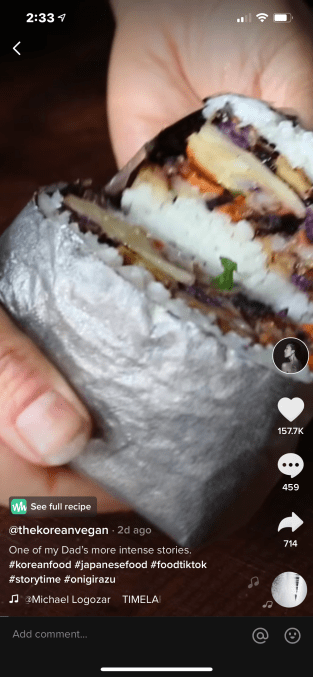
Image Credits: TikTok screenshot
The button was also first spotted by social media consultant Matt Navarra on the @feelgoodfoodie TikTok account.
The way the feature works, from the TikTok viewer’s side, is fairly simple.
A user who’s in the test group may come across a video on the app that includes the new button that reads: “See full recipe.” The button appears just above the creator name and video description on the bottom left of the screen — the same spot where the “Green Screen” button would otherwise appear. When tapped, you’re directed to a Whisk page where you can view recipe photos, see ingredients and choose to save the recipe to your own collection, if you’re a Whisk user.
This all takes place while still inside the TikTok app.
On the creator’s side, adding the recipe button to a video is done during the posting workflow via a new “add link” option.
The ability to add a “save recipe” feature to a TikTok video wouldn’t necessarily have to be limited to food content creators, however. Whisk allows anyone to create a recipe community on its platform, which means people can grow their followings simply by curating their favorite recipes around some sort of category or theme — like Instant Pot meals or favorite smoothie ideas or comfort baking, for example.
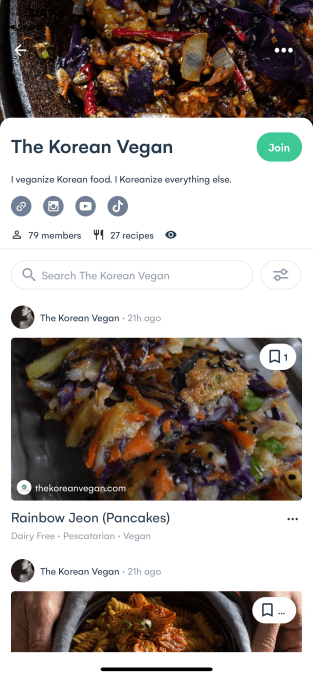
Image Credits: Whisk
Whisk has also been working more recently to expand its recipe communities to serve as a home for curators and creators alike by allowing them to point to their websites, if they have one, or link out to their social media profiles, including Instagram, YouTube and, of course, TikTok.
The idea is that fans would view the content on social media and be inspired, then visit Whisk as the next step in terms of saving the recipe, creating a shopping list or actually trying the recipe at home. This sort of “actionable” content could present a challenge to Pinterest, which has been expanding into short-form video through Story Pins. The feature allows Pinterest creators to share video content in the tappable “story” format — including recipe and cooking videos.
Pinterest hoped to use Story Pins as a way to differentiate its short-form videos from rivals, noting during its earnings last week that Story Pins are “not as focused on entertainment,” but rather “what the Pinner could do to enrich their own lives.”
TikTok’s selection of Whisk as a new partner makes sense as the recipe app has gained a rapid following since its late 2019 launch. Today, Whisk sees over 1.5 million interactions per month on its platform. It also just won a “Best of 2020″ Google Play award.
Whisk’s TikTok button, however, is not the first integration of its kind.
Last month, learning platform Quizlet announced a similar TikTok feature aimed at creators in the education space. In its case, the buttons overlaid on top of videos would link directly to Quizlet’s study sets, like its digital flashcards. At the time, it wasn’t clear that the new Quizlet feature was a part of a larger effort to connect TikTok videos more directly with related apps and services — an addition that could lead to an expansion in TikTok content and, perhaps, influencer sponsorships, further down the road.
There’s potential for TikTok to form other partnerships like this as well, given the app’s ability to drive trends across a number of content categories, effectively becoming the video alternative to Pinterest’s image bookmarking site.
At year-end, for example, TikTok published lists of 2020’s “top trends” in cooking, music, beauty and style. On the style front, TikTok already ran a livestreamed video shopping pilot with Walmart that used influencers to drive purchases, demonstrating the potential in connecting video inspiration to consumer action in an even more timely fashion.
Powered by WPeMatico
“For All Mankind: Time Capsule” is a new augmented reality app created by Apple to promote the upcoming second season of “For All Mankind,” which premieres on February 19 on Apple TV+.
Even for those of you who aren’t fans of the the show — which tells the story of an alternate history in which the Soviet Union beat the United States to the moon leading to an extended space race in the ’70s and beyond — the app is still noteworthy as another sign of Apple’s interest in AR, even beyond the reports that it’s working on AR glasses.
“Time Capsule” takes place during the decade-long gap between seasons one and two, tracing the relationship between Danny Stevens and his parents, the astronauts Gordo and Tracy Stevens. Users who download the free iOS app will be able to interact with a variety of objects — such as a mixtape and an Apple II computer — that illustrate the family relationship.
“Time Capsule” walks users through a linear experience with between 45 and 60 minutes of content, but it sounds like it’s also designed to support further exploration and additional visits. You’ll be able to check “D-mail” and play a text adventure game on the computer, and if you’ve got an Apple device with a LiDAR scanner (such as an iPhone 12 Pro, iPhone 12 Pro Max or iPad Pro) you can use a virtual slide projector to project Danny’s family photos onto your own walls.

Image Credits: Apple
“For All Mankind” producer Ben McGinnis said the app was created in parallel with the show’s second season, with the creative team working with Apple to figure out “which objects were best for getting the story across,” and offering feedback as the actual AR objects were developed.
Creator and executive producer Ron Moore added that he’s excited about the possibility of giving fans new ways to explore the show’s world and characters, especially since writers on the show often create far more material than what ends up on screen.
“Part of the promise of this technology is that a fan of any show, by definition, usually wants to know more about it, more about the characters,” Moore said.
In this case, “For All Mankind”‘s team had written things like love letters and newscasts that are only seen briefly on screen. They could then be used in the app, along with additional material by Stephanie Shannon, a writer on the show. The key, Moore said, is to “play fair by the audience that just wants to show up.”
“You can certainly watch ‘For All Mankind’ on-air without the AR stuff,” he added. “But if you do the AR stuff first, it enriches your experience.”
Powered by WPeMatico
Mobile analytics and market data company App Annie launched a new app today that CEO Ted Krantz said is built not for the analyst who’s “immersed in the data,” but rather the executive who needs “a much more elevated, top-down view.”
The biggest new piece of the company’s Pulse app is something called the App Annie Performance Score, which Krantz compares to a FICO score for mobile apps. The idea is to take an app’s user acquisition, engagement, monetization and sentiment and boil them down into a single score that benchmarks how the app is performing relative to the competition.
Krantz said that eventually, the performance store could become more customizable for each customer, so that “you can tailor it to the metrics that matter to you.” The app also highlights any shifts in key app metrics and identifies potential causes, and it includes a newsfeed showing what’s happening to the apps and markets that a user follows.
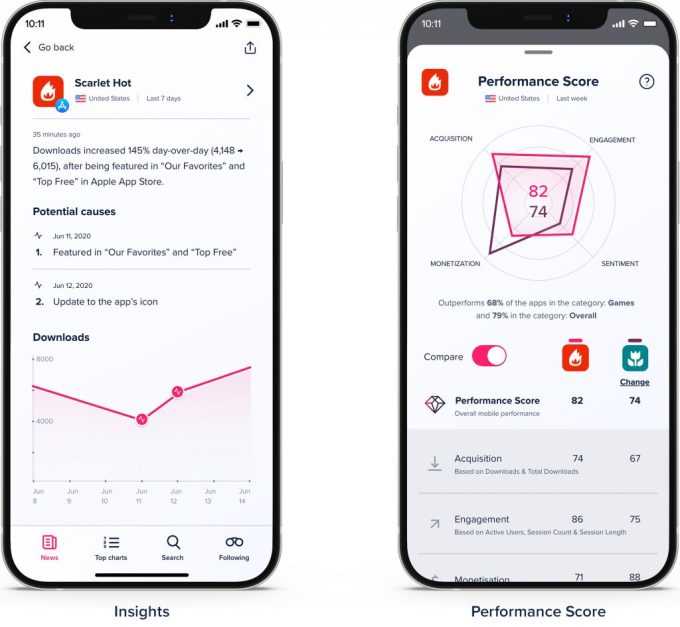
Image Credits: App Annie
The goal, Krantz added, is to provide executives with a quick overview of the data they need without requiring them to dig through it or wait for a report — especially as “mobile is becoming such an imperative.” It’s the team’s “aspiration” to create an app that executives check every day, though he’s not necessarily expecting that to happen initially.
The Pulse app is based on App Annie’s market-level data, so Krantz said it shouldn’t be affected by Apple’s upcoming privacy changes. At the same time, he acknowledged that the company’s broader goals of bringing together first-party and third-party data are starting too look “a little tricky.”
App Annie Pulse is currently available on iOS, with the company planning to launch an Android version in the second quarter of this year. And while the full features of Pulse are only available to paying App Annie customers, Krantz said there are also plans for “revamping the free side of the equation and make that a little more meaty.”
Powered by WPeMatico
Meet Powder, a French startup that helps you share video clips of your favorite games, follow people with the same interests and interact with them. The company has raised a $14 million Series A round led by Serena.
Powder wants to build the video infrastructure for social gaming. While many communities of gamers already share content on Twitch, Discord and Reddit, there isn’t a dominant mobile app focused on gaming.
You could call it an Instagram or Snapchat for gamers, but the startup has built specific tools that make it similar and yet different from those mainstream social platforms.
Powder can capture video content from any platform. You can record with your console and access your footage by connecting your account with Powder. You can capture videos on your PC using the company’s desktop app. You can also capture videos of mobile games.
The company tries to identify the most relevant events in your favorite game — it can be when you score a goal on Rocket League, when you are the last person standing in Fortnite, etc.
You can then trim your video, add filters, music and stickers and share a video with your followers. Other users can share reactions, add comments and send messages.

Image Credits: Powder
Overall, the company has raised $18 million and is pretty transparent about its funding story. In August 2018, the company raised a $400,000 pre-seed round with Kima Ventures and the co-founders of Zenly, Antoine Martin and Alexis Bonillo. In March 2019, General Catalyst, Slow Ventures, Dream Machine, SV Angel, Brian Pokorny, Florian Kahn and Guillaume Luccisano invested $1.5 million.
Around May 2020, the company had to raise a $1.3 million seed extension with Alven Capital, Seraam Invest, Farmers, Maxime Demeure, Jean-Nicolas Vernin and some existing investors. Bpifrance and CNC also put some money in the company. And now, Serena is leading the $14 million Series A round with General Catalyst, Slow Ventures, Alven Capital, Bpifrance’s Digital Venture fund, Secocha Ventures, Turner Novak and Kevin Hartz also participating in today’s round.
As you can see, it’s been a long and winding road. That’s because Powder didn’t come up with its social app for gamers overnight. The company tried many different consumer apps. It would iterate on an idea for a few weeks and then kill the concept if it didn’t pan out. With Powder, the company seems to have found a great distribution mechanism to attract more downloads, leading to more users.
“The idea behind Powder started in December 2019. We had already worked on several projects and none of them really took off. We thought we would create a community first and then a product,” co-founder and CEO Stanislas Coppin told me. He previously co-founded Mindie, a music video app.
Powder started as a Discord server with tens of thousands of members. The team then developed an app that would appeal to that community, the “metaverse camera” as Coppin says. Overall, 1.5 million people have downloaded the iOS app since its launch.
There are three other co-founders: Barthélémy Kiss, Yannis Mangematin and Christian Navelot. There are 18 employees and the company just launched on Android.
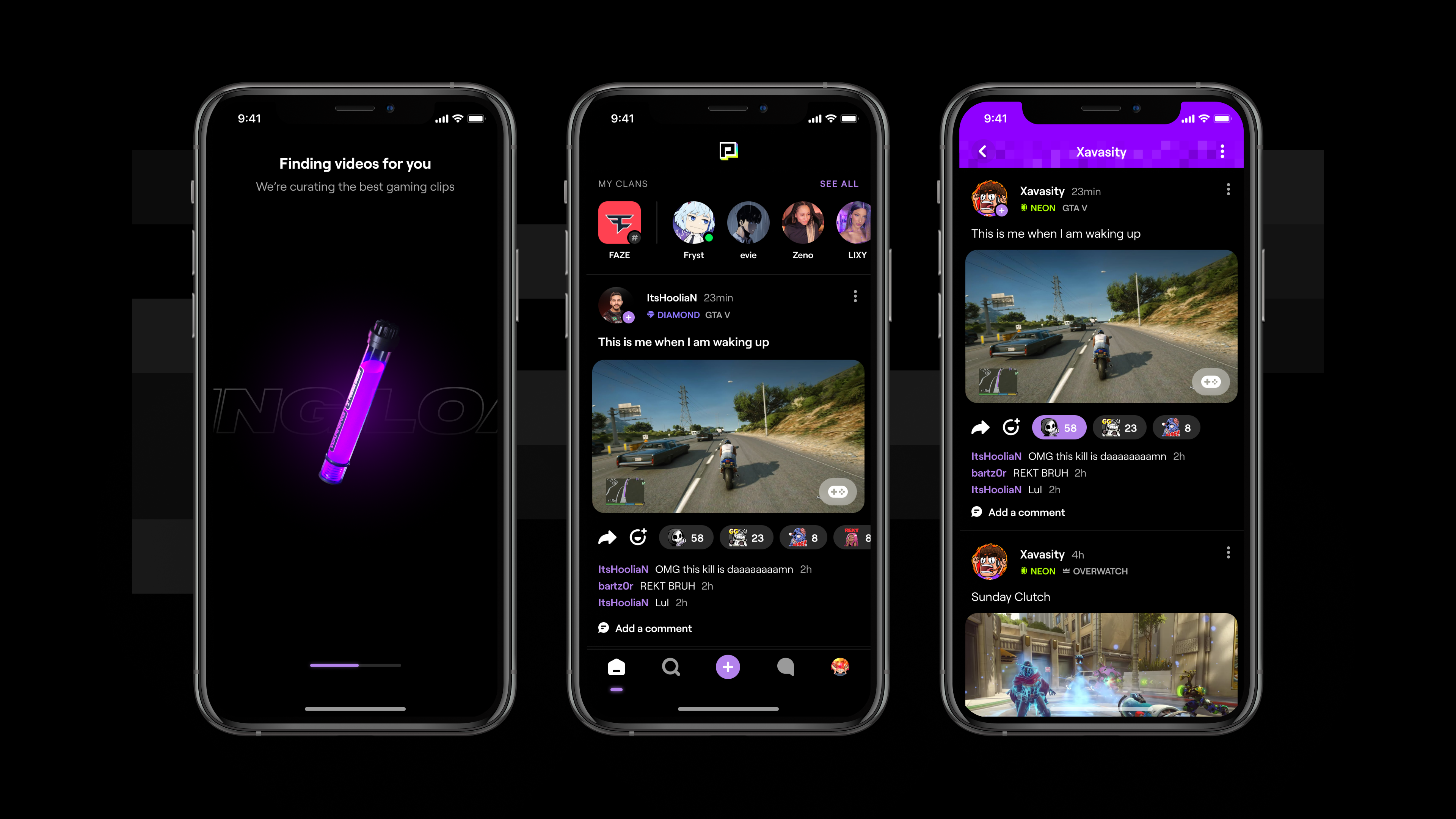
Image Credits: Powder
Powered by WPeMatico